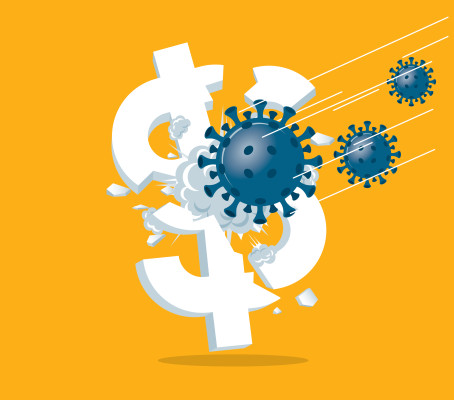The coronavirus pandemic continues to unfold with no indicators of abating. Over 100,000 cases have been confirmed in nearly 100 international locations throughout the globe as of this writing. Some 4,000 deaths have been reported, 80% of which occurred in mainland China.
Preventive measures taken by the general public sector and by international business are already having widespread results. Prior to now a number of days, United States of America has officially imposed a whole-country lockdown and within the U.S., epicenter states reminiscent of California and New York have declared emergency standing whereas instituting lockdowns on high-risk districts reminiscent of New Rochelle. Final week, the OECD lower international financial progress projections by half, and the JPMorgan World Manufacturing Buying Supervisor’s Index (PMI) fell to its lowest level since 2009. Quite a few corporations together with Apple and Nvidia have reported underwhelming earnings in latest quarters and have proceeded to chop their earnings steerage for the foreseeable future.
These financial impacts are partially associated to disruption in demand for items, on account of quarantines and journey restrictions. Nevertheless, extra nefariously, financial pundits have expressed concern for supply-side disruptions: together with employees productiveness losses, supply-chain dysfunction, and facility closures.
In line with a Dun & Bradstreet whitepaper released this week, 94% of Fortune 1000 corporations have key parts of their provide chain housed immediately inside the epicenter of the outbreak in China. Provide-side shocks are much more difficult for central banks to include by strikes such as interest-rate cuts or monetary stimulus. These usually serve to catalyze demand (via elevated money or borrowing energy), however don’t immediately alleviate the form of manufacturing paralysis able to hamstringing international commerce.
How these preventive measures implicate startups
Startups are particularly weak to such supply-side disruptions, every of which is value contemplating independently.
Decreases in employees productiveness
Working via lean organizational structures through which personnel typically occupy cross-functional roles, decreases in employees productiveness can create important points for interdependent actions at startups. The diversion of consideration — due alternatively to the necessity to attend to private wants (reminiscent of household caregiving, healthcare points, or family issues) or societal necessities (reminiscent of monitoring the event of the virus and state or federal reactions to it) — can make a cumulative impact over the times, weeks, and months of the outbreak.
The elevated frequency of absences to attend to private points (reminiscent of particular person healthcare or childcare amidst college closings) likewise presents a significant problem to success of contracts and different enterprise obligations for startups. A CNBC survey carried out two weeks in the past discovered that some 40% of corporations had “stranded workers” dealing with some type of hurdle to commuting to the office. These figures are doubtless greater immediately.
Furthermore, elevated frequency of absences may be accompanied by heightened utilization of benefits (reminiscent of healthcare, sick go away, or household go away) in a brief interval, which startups could or could not have ample liquidity to help. These concerns round advantages are particularly tenuous for startups within the gig economy, who could have to compensate affected workers regardless of their ability to perform tasks.
Provide-chain dysfunction
Turmoil in provide chains can bear significant consequences for startups throughout a various vary of sectors, together with know-how and healthcare. That is particularly the case on condition that these provide chains are typically concentrated via solely a particular group of distributors.
Since China is the world’s largest producer of commercial items (particularly, fundamental elements), typically on the world’s lowest costs, the widespread quarantines within the area are already proving debilitating: the variety of bulk freight shipments has fallen over 70% since January and a few 40% of China’s trucking capability stays offline. And whereas American corporations have sought to diversify away from China lately (partially on account of political rhetoric), because the viral outbreaks unfold to different main manufacturing international locations (reminiscent of Vietnam, Bangladesh, and Mexico), provide chains for instrumental elements will doubtless face shortages, delays, and high quality compromises.
By way of companies, startups typically depend upon regulatory, authorized, and industrial collaborators for deliverables which are a prerequisite to their doing enterprise. Disruptions on this “soft” supply chain able to delaying important credentialing, contracting, or information acquisition can show incapacitating for startups. Moreover, the proliferation of outsourcing (on the order of 14 million jobs in 2015) in service provide chains for crucial duties reminiscent of customer support and administrative workflows implies one other dimension of vulnerability for service provision.
For both items or companies provide chains, to the extent that startups have comparatively undiversified income streams — from a single or small group of contracts — these varied types of provide chain bottlenecks may be crippling (of fundamental success) within the short-run and compromising (of scaling and popularity) within the long-run.
Facility closures
Lastly, startups ought to think about the impression that closing and/or limiting their amenities can have on their efficiency.
Latest pointers from the Facilities for Illness Management (CDC) and Occupational Security and Well being Administration (OSHA) embrace suggestions for employers to develop “infectious illness outbreak response plans” which will require workplace/manufacturing unit closures. Already, employers throughout the US are getting ready for “social distancing measures” which are, in a single day, converting physical workforces into virtual ones.
With the acceleration of community spread resulting in diffusion of the virus out past US city facilities effected to date (specifically, New York Metropolis and San Francisco), an increasing number of startups residing in neighboring suburbs could face closing their office.
Steps stakeholders in startups can take to offer stability
Taken collectively at face worth, these supply-side concerns can appear overwhelming for startups already dealing with innumerable day by day “fires” that want extinguishing. Nevertheless, there are a variety of steps that CEOs, funders, and companions/purchasers of startups can take to inoculate themselves towards the exogenous menace posed by coronavirus.
Startup CEOs ought to think about operational, organizational, and monetary workarounds.
Operationally, they will take steps to organize for a digital office by establishing clear strategies of digital communication and metrics to make sure productiveness. They will additionally prepare for an “interrupted” workplace (through which workers require extra time than standard for private affairs and could also be in any other case preoccupied) by embracing asynchronous workflows, laying out clear priorities for deliverables, and offering flexibility past customary workplace hours.
Organizationally, CEOs can cross-train workers and develop clear workflow protocols to insulate against staffing deficits which will come up. To fortify their organizational methods, CEOs can determine weak factors and/or main dependencies of their provide chains. In flip, they will search to hedge towards these the place potential: both via delegation to further firms or via integration internally.
Financially, to the extent potential, CEOs can shift their enterprise fashions to prioritize revenue over growth within the short-run, making certain liquidity towards sudden provide or demand shocks. This may be achieved via value discount or signing small-scale contracts (moderately than “pursuing Moby Dick”). Alternatively, CEOs can take into account elevating anticipatory funding, even when within the excellent world they may defer a increase in pursuit of upper valuations.
Funders of startups are likewise nicely positioned to buffer towards the fever state of startups. Offering management for early, anticipatory fundraising can help the stockpiling of dry powder to outlive a prolonged siege by coronavirus (due, for instance, to structural modifications to the provision chain within the wake of the pandemic). It may additionally promote the creation of a struggle chest to permit startups to adapt underneath these irregular circumstances.
Moreover, funders can leverage their expertise and networks to share learnings on coping with related challenges — due to this fact cultivating an ecosystem of resilience for doubtlessly inexperienced leaders through the tumult related to coronavirus.
Lastly, companions and purchasers of startups have an important supporting role to play. It is rather a lot in their very own curiosity to make sure the vitality of startups upon which they rely: to avoid the costs of restructuring their very own enterprise fashions ought to a startup companion/vendor go defunct, and to empower their very own innovation pipelines. As such, companion and shopper corporations are nicely positioned renegotiate contractual phrases to facilitate short-term flexibility whereas additionally making certain long-term efficiency. Alternatively, they will redesign incentives and milestones in a method that may present operational and monetary safety to startups in the meanwhile with out sacrificing the general worth anticipated within the extra distant horizon.
Surviving coronavirus can bolster the immune programs of startups sooner or later
The coronavirus pandemic is more likely to pressure the capabilities of startups for the foreseeable future. Provide-side disruptions will current distinctive challenges to startups in contrast to those who usually crop up in a globalized economic system.
Nonetheless, via eager vigilance, fast adaptation, and complete contingency planning, startups can survive the upcoming stress take a look at. And in so doing, like white blood cells after a extreme an infection, surviving startups can develop resistance towards the next challenges they may inevitably face of their lifetimes.



















